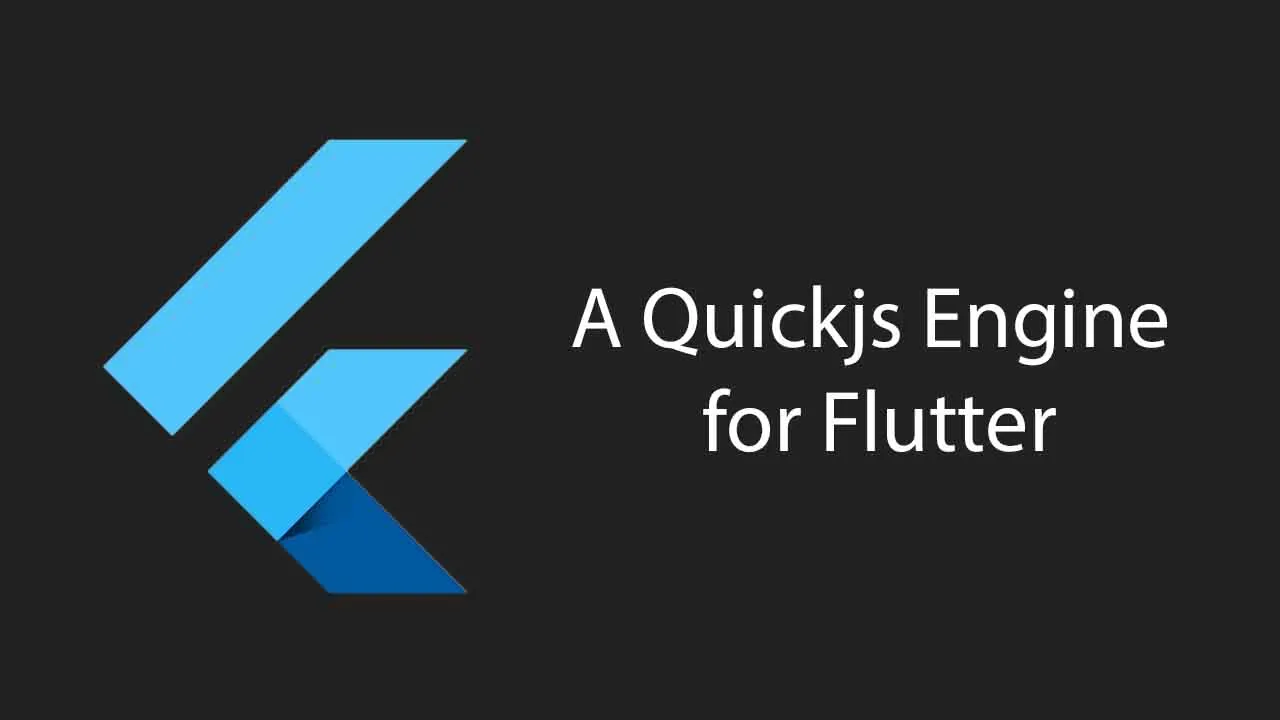A Quickjs Engine for Flutter
flutter_qjs
This plugin is a simple js engine for flutter using the quickjs project with dart:ffi. Plugin currently supports all the platforms except web!
Getting Started
Basic usage
Firstly, create a FlutterQjs object, then call dispatch to dispatch event loop:
final engine = FlutterQjs(
stackSize: 1024 * 1024, // change stack size here.
);
engine.dispatch();
Use evaluate method to run js script, now you can use it synchronously, or use await to resolve Promise:
try {
print(engine.evaluate(code ?? ''));
} catch (e) {
print(e.toString());
}
Method close can destroy quickjs runtime that can be recreated again if you call evaluate. Parameter port should be close to stop dispatch loop when you do not need it.
engine.port.close(); // stop dispatch loop
engine.close(); // close engine
engine = null;
Data conversion between dart and js are implemented as follow:
| dart | js |
|---|---|
| Bool | boolean |
| Int | number |
| Double | number |
| String | string |
| Uint8List | ArrayBuffer |
| List | Array |
| Map | Object |
| JSFunction(…args) | |
| IsolateJSFunction(…args) | function(…args) |
| Future | Promise |
notice: function can only be sent from js to dart.
Invoke dart function
A global JavaScript function channel is presented to invoke dart function.
In constructor, pass handler function to manage JavaScript call. For example, you can use Dio to implement http in JavaScript:
final engine = FlutterQjs(
methodHandler: (String method, List arg) {
switch (method) {
case "http":
return Dio().get(arg[0]).then((response) => response.data);
default:
throw Exception("No such method");
}
},
);
then, in java script you can use channel function to invoke methodHandler, make sure the second parameter is a list:
channel("http", ["http://example.com/"]);
Use modules
ES6 module with import function is supported and can be managed in dart with moduleHandler:
final engine = FlutterQjs(
moduleHandler: (String module) {
if(module == "hello")
return "export default (name) => `hello \${name}!`;";
throw Exception("Module Not found");
},
);
then in JavaScript, import function is used to get modules:
import("hello").then(({default: greet}) => greet("world"));
notice: Module handler should be called only once for each module name. To reset the module cache, call FlutterQjs.close then evaluate again.
To use async function in module handler, try Run on isolate thread
Run on isolate thread
Create a IsolateQjs object, pass handlers to implement js-dart interaction and resolving modules. The methodHandler is used in isolate, so the handler function must be a top-level function or a static method. Async function such as rootBundle.loadString can be used now to get modules:
dynamic methodHandler(String method, List arg) {
switch (method) {
case "http":
return Dio().get(arg[0]).then((response) => response.data);
default:
throw Exception("No such method");
}
}
final engine = IsolateQjs(
methodHandler: methodHandler,
moduleHandler: (String module) async {
return await rootBundle.loadString(
"js/" + module.replaceFirst(new RegExp(r".js$"), "") + ".js");
},
);
// not need engine.dispatch();
Same as run on main thread, use evaluate to run js script. In this way, Promise return by evaluate will be automatically tracked and return the resolved data:
try {
print(await engine.evaluate(code ?? '', "<eval>"));
} catch (e) {
print(e.toString());
}
Method close can destroy quickjs runtime that can be recreated again if you call evaluate.
This example contains a complete demonstration on how to use this plugin.
For macOS & iOS developer
I am new to Xcode and iOS developing, and I cannot find a better way to support both simulators and real devices without combining the binary frameworks. To reduce build size, change the s.vendored_frameworks in ios/flutter_qjs.podspec to the specific framework.
For simulator, use:
s.vendored_frameworks = `build/Debug-iphonesimulator/ffiquickjs.framework`
For real device, use:
s.vendored_frameworks = `build/Debug-iphoneos/ffiquickjs.framework`
Two additional notes:
-
quickjs built with
releaseconfig has bug in resolvingPromise. Please let me know if you know the solution. -
ios/make.shlimits the build architectures to avoid combining conflicts. Change themake.shto support another architectures.
Download Details:
Author: ekibun
Source Code: https://github.com/ekibun/flutter_qjs
#flutter #dart #mobile-apps
